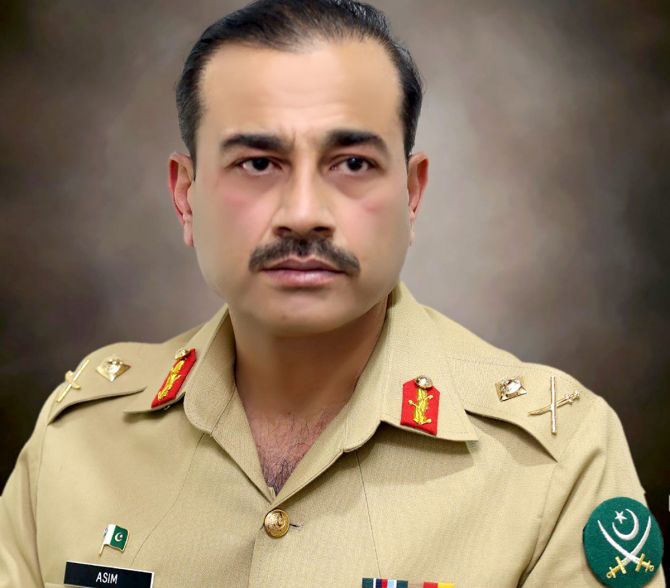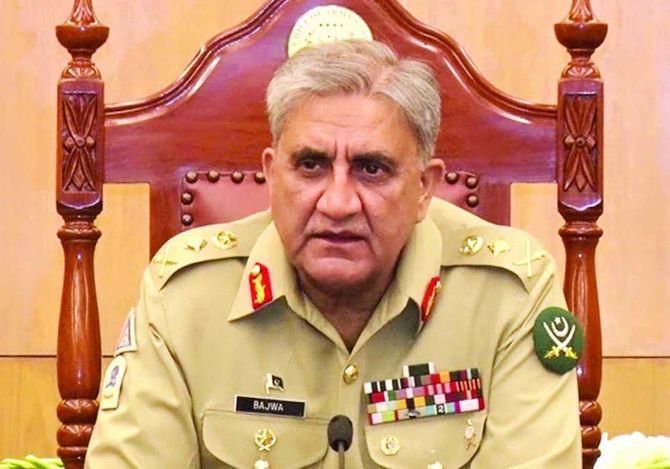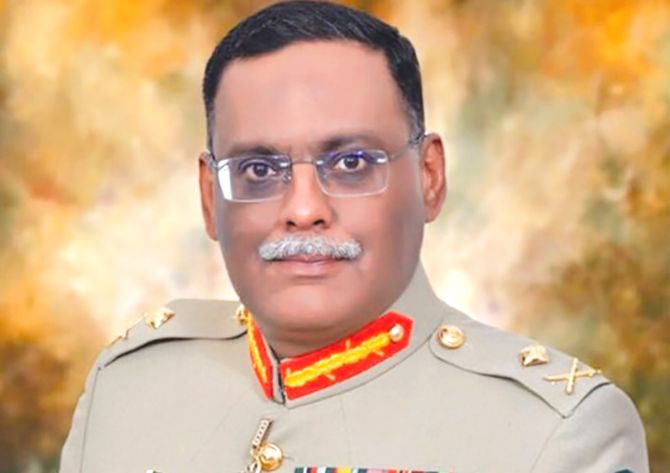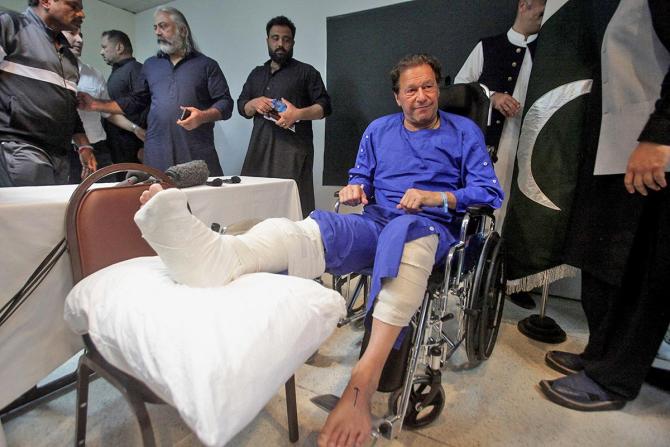If General Asim Munir, Pakistan's new army chief, wants to help defuse the current polarised atmosphere and shepherd civilian politicians towards negotiations on an acceptable date for elections, he may need to distance himself from any perception of needless hostility to Imran Khan, explains Rana Banerji, who headed the Pakistan desk at RA&W, India's external intelligence agency.

After a seemingly inordinate delay during which contradictory statements emerged from Interior Minister Rana Sanaullah and Defence Minister Khwaja Asif about the process, Lieutenant General Syed Asim Munir Shah of the Frontier Force Regiment was appointed Pakistan's new army chief on November 24.
The summary of Prime Minister Shahbaz Sharif's decision is being sent to President Arif Alvi. The take-over of the chief of army staff's baton will be effective from November 29, 2022, when General Qamar Javed Bajwa retires after a controversial six year tenure.
From the very outset, this decision has become mired in controversy as the announcement has been made before President Alvi could accept the 'binding advice' of Prime Minister Sharif prescribed under Article 243(4) of the 1973 constitution.
Under Article 48 (1) thereof, the president has the option to delay accepting the PM's advice.
Former PM Imran Khan, who had focused on making the selection of the new army chief controversial during his entire agitational programme in the last six-seven months, told a television channel on November 23 that Dr Alvi was in touch with him and would consult him on the army chief's appointment.
Finance Minister Ishaq Dar said the government had 'a plan B' if the president tried to create hurdles in the appointment.
A lingering 'technical issue' has been complicating the appointment, pertaining to the date from which the seniority and pecking order of eligible panelists should apply.
Lieutenant General Asim Munir was slated to retire on November 27, two days before General Bajwa retires on November 29.
A section of retired lieutenant generals known to have sympathy for Imran Khan such as Asif Yasin, Tariq Khan and Naeem Lodhi declared publicly in favour of deeming the seniority date valid from November 29, not November 27.
After several rounds of informal discussion with his allies, PM Sharif planned to tackle this glitch during a cabinet meeting on November 24, where relevant rules of business relating to the Army Act, 1952 would be used to authorise him to retain Lieutenant General Asim Munir's services till he takes over formally as the chief of army staff, COAS.
A summary to this effect was revealed subsequently.
As the dust settles, General Munir would be Pakistan's 15th army chief (not counting the two British officers -- Frank Messervy and Douglas Gracey, who helmed it between 1947-1951).
He would be the fourth chief from the illustrious Frontier Force Regiment regiment, set up by the British as the third oldest infantry unit in Pakistan in 1843, after the Punjab and Baloch regiments.
Three other chiefs from the Frontier Force Regiment were General Muhammad Musa Khan (1958-1966), General Abdul Waheed Kakar (1993-1996) and General Raheel Sharif (2013-2016).
Of the 14 Pakistani chiefs before him, 3 have come from the Armoured Corps (General Gul Hassan, General Zia-ul Haq, General Jehangir Karamat), 2 from Artillery (General Tikka Khan, General Pervez Musharraf), 2 from the Punjab (Field Marshal Ayub Khan, General Asif Nawaz) and 4 from the Baloch regiments (General Yahya Khan, General Mirza Aslam Beg, General Ashfaq Pervez Kayani, General Bajwa).
Ethnically, Lieutenant General Munir joins the 7 Punjabis who have become army chief (Tikka Khan, Zia-ul Haq, Asif Nawaz, Jehangir Karamat, Ashfaq Kayani, Raheel Sharif, Qamar Bajwa), 3 Pashtuns (Ayub Khan, Gul Hassan, Abdul Waheed Kakar), 1 Hazara (Musa Khan), 1 Qizilbash (Yahya Khan) and 2 Mohajirs (Aslam Beg, Pervez Musharraf).
Alongside, the appointment of Lieutenant General Sahir Shamshad Mirza has also been announced as chairman, joint chiefs of staff committee (CJCSC), Pakistan's other 4 star general post, after the the current CJCSC Chairman General Nadeem Raza's retirement on November 27.

Lieutenant General Munir hails from a modest middle class family in Dheri, near Rawalpindi. He is a sword of honour, though not from a regular Pakistan Military Academy, Kakul Long Course but from the 17th Officers Training School Course at Mangla.
The OTS was a feeder stream started in 1948 to meet the shortage of officers. It used to be located in Kohat, North West Frontier Province (now Khyber Pakhtunkhwa-KP) till 1960.
From 1962 to 1990 it was shifted to Mangla. OTSC are no longer run there. Instead, the facility is now equipped as the junior commissioned officers academy.
The peer group of lieutenant generals whom Asim Munir just managed to pip in the seniority stakes, include Sahir Shamshad Mirza, Athar Abbas, Nauman Mehmood Raja and Faiz Hameed.
They are from the 75th Pakistan Military Academy long course, of 1986 vintage.
Though not overtly stated, a possible 'caste system' prevails in the Pakistan army, where regular Pakistan Military Academy long course recruits are considered superior or better professionals than Officers Training School recruits, not that this has precluded OTS recruits from reaching the top slot.
General Munir's predecessors from the OTS stream who became chiefs included Generals Musa (who came up from the ranks of JCOs) and Zia-ul Haq.
Zia's trusted lieutenant, General K M Asif, who virtually ran the Army as vice chief during Zia's long presidency and turbulent martial law rule was also an OTS alumni.
Lieutenant General Munir may count himself to be rather lucky at this quirk of fate which left him as the senior-most among three star generals when the COAS selection sweepstakes came up.
Though well liked by General Bajwa and brought in to hold crucial assignments as commander, Force Command Northern Areas (FCNA), then as director-generaal Military Intelligence (DGMI) and promoted as DG, Inter Services Intelligence (ISI) in October 2018, he became a lieutenant general late, in November 2018.
He had served in Saudi Arabia and as chief instructor in the Command and Staff College, Quetta earlier.
As a Hafiz e Quran, a course which he completed as a colonel, he is also known for his ability to recite virtually all of the Quran.
He was transferred out from ISI under a cloud after just nine months, apparently because then PM Imran Khan took umbrage at his 'private' whistle blowing role, apprising the latter of alleged financial misdemeanors of certain associates close to First Lady Bushra Sheikh aka 'Pinky Pir'.
Imran asked General Bajwa to shift Lieutenant General Munir out of the ISI. He was then posted out to the XXX Corps, Gujranwala in June 2019.
After a two year stint there, he was appointed as the Pakistan army's Quartermaster General at General Headquarters in Rawalpindi from October 2021.
Former prime minister Nawaz Sharif, PM Shahbaz Sharif's elder brother, possibly took on board Lieutenant General Munir's latent angst against Imran Khan and opted firmly for him when consulted in London by his visiting brother recently.
Nawaz Sharif's unfortunate experience in choosing the army chief five times in the past did not seem to deter him from giving this advice.
Though Nawaz was not a great believer in the seniority yardstick in the past, much was made of it this time to justify Lieutenant General Munir's appointment.

Meanwhile, after the abortive attempt on his life in Wazirabad on November 3, Imran Khan has been trying to take stock of what political options he now has before him.
He declared he is moving on from allegations of a sinister foreign conspiracy behind his ouster.
Effecting another 'U turn', Imran declared he will now accept any decision the government makes on the army chief's appointment.
Yet, he is poised to be present at a public demonstration in Rawalpindi and Islamabad on November 26, to extract whatever mileage he can from perceptions of division within the army.
Against his backdrop, General Munir would have his job cut out.
His priority must clearly lie in ending dissensions within the army, at middle or even more senior levels, which have simmered during the recent fracas between General Bajwa and Imran Khan.
General Munir will have to lend a healing touch even as he puts his own team of officers in place.
Postings of three newly promoted lieutenant generals -- Nauman Zakaria, Ahsan Gulrez and Shahid Imtiaz -- had not been declared during the October 12 reshuffle, possibly keeping this requirement in mind.
At the same time, as a rather embarrassing disclosure about General Bajwa's family's recently escalated financial assets surfaced on journalist Ahmed Noorani's 'Fact Focus' Web site on November 22, the new chief may have to nip in the bud any possible witch-hunting which may ensue against General Bajwa in the days to come.
Speaking 'for the last time' as army chief on the occasion of a martyrs' day function on Wednesday, November 23, General Bajwa spoke rather frankly about the 'catharsis' in the army under his leadership, as it had decided to become neutral in domestic politics from February, 2021 onwards.
Without mentioning names, he was very critical of unwarranted strong language used by some politicians (read Imran Khan) while criticising the Army.
Admitting to mistakes on the part of all concerned, he observed, this was a moment to move forward.

While General Munir may feel naturally obliged at the manner in which the Pakistan Democratic Movement government stretched backwards to smoothen ruffles about his retiring date, if he wants to help defuse the current polarised atmosphere and shepherd civilian politicians towards negotiations on an acceptable date for elections, he may need to distance himself from any perception of needless hostility to Imran.
Yet he cannot disregard the angst of senior officers against the latter's unparliamentary criticism, voiced so strongly at a recent press conference (October 27) by the current DG, ISI Lieutenant General Nadeem Anjum.
All of these challenges make for a formidable platter of woes for General Munir to tackle.
Whether his response to these problems impact in any manner on the difficult economic scene facing Pakistan or in defining any new initiatives on India policy is doubtful, but new nuances on the army's professed intention to play a neutral role in domestic politics could yet emerge.
Scepticism in this regard will persist among Pakistan watchers.
Feature Presentation: Aslam Hunani/Rediff.com










